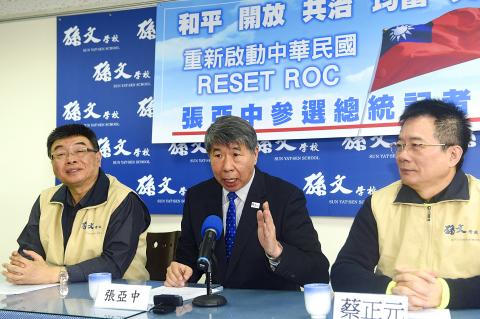Sun Yat-sen School president Chang Ya-chung (張亞中) yesterday announced that he would seek the Chinese Nationalist Party’s (KMT) nomination to run for president in 2020, saying that he would engage in talks with Beijing and explore the possibility of unification if elected.
Chang, a National Taiwan University political science professor and former diplomat, is the second KMT member to express his intention to vie for the presidential nomination after former New Taipei City mayor Eric Chu (朱立倫).
By joining the primary race, he hopes to “reset the Republic of China and the KMT” as the nation faces a series of political, economic and identity crises at home and abroad, he told a news conference at the KMT-affiliated school in Taipei.

Photo: George Tsorng, Taipei Times
The KMT must “eliminate its feudal culture and tendency to ignore rules” and “reform itself into a party with ideals and clear rules, energetic and close to the public,” he said.
With new-found values, the party could reset the nation, beginning with the 2020 presidential election, he said.
Commenting on Chines President Xi Jinping’s (習近平) call on Wednesday last week for unification, Chang said that while Xi proposed “one country, two systems” as a framework for governance after unification, he is more concerned about putting an end to the hostility between the two sides, which would be “more practical and necessary.”
He said he would sign a peace treaty with Beijing on the premise of “one China, with each side having its own constitutional government” to ensure the peaceful development of both sides.
Following that, “it would be natural to explore the option of unification,” he said, adding that the two sides of the Taiwan Strait are like “brothers of one family” and “there is nothing brothers cannot talk about or cannot compromise on.”
A peace treaty would allow the government to reduce its military spending, and focus on economic development and social security, he said.
It would also pave the way for negotiating increased participation by Taiwan in international organizations and meetings, he added.
“The KMT and the Democratic Progressive Party have both been avoiding elaborating on cross-strait relations, but the problem can only be solved by confronting it,” he said.
Once an aide of Hung Hsiu-chu (洪秀柱) when she was KMT chairwoman, Chang said that he believes Hung would support him, as they “share similar beliefs.”
“Hung played the first half and I will play the second half,” he added, referring to Hung’s short-lived bid for presidency in 2015.
Hung, who advocated a “one country, same interpretation” formula, was nominated as the party’s presidential candidate in July 2015, but replaced by Chu after three months, as a majority of party members found her support for unification controversial.
Chang’s platform also includes replacing the semi-presidential system with a parliamentary system, increasing the number of legislative seats from 113 to 200, abolishing the Transitional Justice Commission, and scrapping all curriculum guidelines for history and social studies previously issued by the government in favor of allowing schools and parents to choose their own textbooks.

Alain Robert, known as the "French Spider-Man," praised Alex Honnold as exceptionally well-prepared after the US climber completed a free solo ascent of Taipei 101 yesterday. Robert said Honnold's ascent of the 508m-tall skyscraper in just more than one-and-a-half hours without using safety ropes or equipment was a remarkable achievement. "This is my life," he said in an interview conducted in French, adding that he liked the feeling of being "on the edge of danger." The 63-year-old Frenchman climbed Taipei 101 using ropes in December 2004, taking about four hours to reach the top. On a one-to-10 scale of difficulty, Robert said Taipei 101

A preclearance service to facilitate entry for people traveling to select airports in Japan would be available from Thursday next week to Feb. 25 at Taiwan Taoyuan International Airport, Taoyuan International Airport Corp (TIAC) said on Tuesday. The service was first made available to Taiwanese travelers throughout the winter vacation of 2024 and during the Lunar New Year holiday. In addition to flights to the Japanese cities of Hakodate, Asahikawa, Akita, Sendai, Niigata, Okayama, Takamatsu, Kumamoto and Kagoshima, the service would be available to travelers to Kobe and Oita. The service can be accessed by passengers of 15 flight routes operated by

Taiwanese and US defense groups are collaborating to introduce deployable, semi-autonomous manufacturing systems for drones and components in a boost to the nation’s supply chain resilience. Taiwan’s G-Tech Optroelectronics Corp subsidiary GTOC and the US’ Aerkomm Inc on Friday announced an agreement with fellow US-based Firestorm Lab to adopt the latter’s xCell, a technology featuring 3D printers fitted in 6.1m container units. The systems enable aerial platforms and parts to be produced in high volumes from dispersed nodes capable of rapid redeployment, to minimize the risk of enemy strikes and to meet field requirements, they said. Firestorm chief technology officer Ian Muceus said

MORE FALL: An investigation into one of Xi’s key cronies, part of a broader ‘anti-corruption’ drive, indicates that he might have a deep distrust in the military, an expert said China’s latest military purge underscores systemic risks in its shift from collective leadership to sole rule under Chinese President Xi Jinping (習近平), and could disrupt its chain of command and military capabilities, a national security official said yesterday. If decisionmaking within the Chinese Communist Party has become “irrational” under one-man rule, the Taiwan Strait and the regional situation must be approached with extreme caution, given unforeseen risks, they added. The anonymous official made the remarks as China’s Central Military Commission Vice Chairman Zhang Youxia (張又俠) and Joint Staff Department Chief of Staff Liu Zhenli (劉振立) were reportedly being investigated for suspected “serious